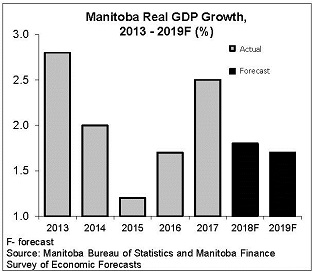Costs for household operations and furnishings have declined in the first half of the year, compared to the same period last year.
Total employment level has recovered in 2018 after slowing in the second half of 2017. In the first eight months of the year, employment increased by 0.5%. The labour force has increased at a faster pace, growing by 1.2%. As a result, the unemployment rate is expected to average 5.8% in 2018.
Average weekly earnings are increasing at about the same rate as last year. Earnings increased by 2.6% in the first half of 2018, compared to 2.5% in 2017. Similarly, compensation of employees, the largest component of the personal income tax base, increased by 3.5% in the first half of 2018 compared to 3.7% in 2017.
After a large upward revision to Manitoba’s retail data in 2017, sales are flat in 2018. In the first half of 2018, total sales were down 0.2% compared to a 7.8% increase in 2017. Sales were sharply lower at motor vehicle and parts dealers, sporting goods, hobby, book, and music stores, and at health and personal care stores. Offsetting the decline, sales were up at electronics and appliance stores and gasoline stations.
Manufacturing sales are currently increasing at a record pace. Last year, sales increased by a record $1.2 billion on an annual basis. In the first half of 2018, annual sales were up by $1.5 billion.
Sales are up in most manufacturing sub-industries, and were led by chemical products, fabricated metals, processed food products, machinery equipment, and transportation equipment. Printed products and primary metal sales are down on a year-to-date basis in 2018.
Associated with manufacturing sales, Manitoba’s international merchandise exports increased by 12.2% in the first half of 2018. Supported by a large increase in sales of pharmaceutical products and a rebound in oil sales, exports are up by 23% to the U.S.
A sharp decline in sales of soya beans to China has reduced overall exports to non-U.S. markets by 7.9% in the first seven months of the year.
As several major building projects near completion, total capital spending on non-residential properties is declining from 2017 record levels. However, investment on industrial properties continues to accelerate as new and expanded capacity is being added in the manufacturing sector.
Larger industrial building projects include investment at Hylife (modernizing and expanding its integrated pork production and processing system), Simplot (more than doubling its processing capacity for frozen french fries), and Roquette (constructing the world’s largest pea-protein processing facility).
According to Statistics Canada, capital spending in manufacturing is expected to reach a record $728 million.
In 2017, housing in Manitoba surged ahead of new regulations (stress test for all mortgage applicants, limiting capital gain exemption on personal property sale to one per year and the Impact Fee on new residential dwellings in the City of Winnipeg). As a result, total housing starts surpassed 7,500 units, the highest since 1987.
As was expected, Manitoba’s housing market is returning to a sustainable pace in 2018. In the first half of 2018, total starts are down 28%. Total sales in the resale market are down less than 7% on a year-to-date basis.
Weather conditions were less than ideal for crops in 2018. Dry and extremely warm weather lowered production from a record 2017 season. Warmer temperatures also advanced the harvest in some regions.
Preliminary estimates show a smaller harvest for most crops. However, the volumes are still relatively high from a historical perspective.
Lower production was estimated for wheat, canola, soybeans, flaxseed and oats. Corn

